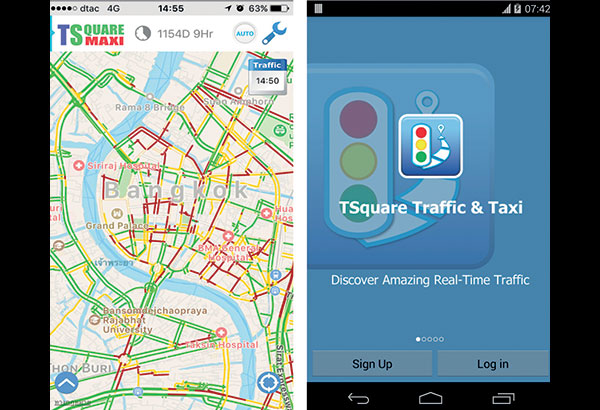Thailand firm eyes ASEAN rollout of traffic info service

Goragot Wongpaisarnsin, assistant GM, Toyota Tsusho, says that Thailand’s traffic information broadcasting system TSquare will be rolled out in the ASEAN region starting 2017.
MANILA, Philippines – Metro Manila’s legendary traffic may be one for the books, but there are cities far more congested than our own. The difference is that other cities have developed applications and leveraged technology to gain better insights about their traffic problem.
The annual traffic index released this year by the Netherlands-based travel company Tom-tom ranks Bangkok as the second most congested city in the world after Mexico City, and one of only two cities in Asia (the other one being Chengdu in China) to make it to the top 10 of 295 cities in 38 countries.
According to the report, Bangkok commuters can expect 57 percent extra travel time stuck in traffic anytime of the day, and up to 114 percent times during evening peak periods, resulting in 61 minutes of extra travel time per day or 232 hours extra travel time per year.
In 2012, Toyota Tsusho Electronics (Thailand), a subsidiary of Toyota Group Japan and manufacturer of vehicle-embedded software applications, launched TSquare, a traffic information broadcasting system, which provides real-time traffic data in Bangkok and six suburb provinces. The company is now eyeing to roll out the application in the ASEAN region next year, the Philippines included.
Basically, TSquare collects data from 130,000 taxis with GPS sensors across Bangkok to create real-time traffic information. This usually includes congestion rate at any given time or location, traffic flow, information about accidents and roadworks, speed limits and lane regulations, and parking availability, among others.
Policymakers, traffic enforcers, motoring companies and businesses interested in the traffic situation could use this real-time information to help improve traffic flow, traffic management, and traffic efficiency or build applications on top of it.
For drivers and commuters, what the TSquare application provides is a mobile application that could help them understand how long they will spend time in travel for the day so they can do something about it or find alternative routes and avoid congested areas altogether.

Using GPS data from 130,000 taxis with embedded sensors in Bangkok and six suburb provinces, TSquare can provide users real-time traffic data and other information.
Goragot Wongpaisarnsin, assistant general manager, Toyota Tsusho, said in a media interview at the sidelines of the Amazon Web Services (AWS) users conference re:Invent in Las Vegas early this month that the service is currently being expanded nationwide in preparation for the regional launch.
“Every city in our region faces the same problems because we are emerging economies. We keep growing. It is a complex problem, but we need to ask ourselves: how can we live with this traffic situation (or even help improve it),” he said.
Under the plan, Toyota Tsusho will be working to incorporate and share traffic information with other countries through partners. Wongpaisarnsin said they are in talks with about 40 companies in the region to form an organization that will be working on the rollout.
Needless to say, the company is a big user of cloud computing technology to power its real-time traffic monitoring service in Bangkok. Wongpaisarnsin said AWS is a technology enhancer for the company.
Among the AWS services it has been using include the Amazon Elastic Compute Cloud (Amazon EC2), a web service that provides resizable compute capacity in the cloud and is designed to make web-scale cloud computing easier for developers; the Amazon Simple Storage Service (S3) service, which is designed for easy web-scale computing; and Amazon Kinesis, a platform for streaming data on AWS.
“Now we are investigating AWS Lambda (a computing service that makes it easy to build applications that respond quickly to new information); and Amazon Elastic MapReduce (EMR), a web service that uses Hadoop to quickly and cost-effectively process vast amounts of data, but these are still in the development stage,” he said.
With more Internet of Things (IoT) devices coming into the market and as more sensors are also embedded in everyday things, including those that track motor vehicles and feed real-time data to a central command center and do real-time analytics, Wongpaisarnsin sees the cloud gaining more traction and relevance in the years to come.
Nick Walton, head of Asean at AWS, said they actually see a lot of use cases of the cloud in Southeast Asia. One example is the Land Transportation Authority in Singapore’s mytransport.sg mobile app, which is used by around 2.2 million commuters. Running the applications on AWS versus running it on its own infrastructure has resulted in an approximately 30 percent reduction in cost. It also allows the agency to deliver more services quickly.
“One of the strengths of AWS is that we operate it (services) at a scale. We also get more feedback from customers. In fact, around 90 percent of our roadmap is driven by customer feedback,” he said.
Toyota Tsusho is currently working with the Thailand government as well as international bodies in providing big data analytics and real-time traffic information so they can make better decisions in designing urban solutions.
“We develop the tools or applications from PCs to smartphones so they (government executives and workers) can start using the information for traffic management,” he said.
Wongpaisarnsin said they have installed 100 GPS in the Philippines under an experimental project that started in 2013 and lasted two years. But should the company deploy the service in the Philippines on a bigger scale and on a more long-term basis, the deployment would be fast because it is cloud-based and if the data is available, a system similar to the Bangkok road traffic project can easily be replicated.
- Latest
























